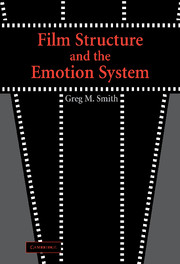Book contents
- Frontmatter
- Contents
- Film Structure and the Emotion System
- PART ONE DEVELOPING THE APPROACH
- 1 An Invitation to Feel
- 2 The Emotion System and Nonprototypical Emotions
- 3 The Mood-Cue Approach to Filmic Emotion
- 4 Other Cognitivisms
- PART TWO ANALYZING EMOTIONAL APPEALS IN FILM
- PART THREE AFTERWORD
- APPENDIX. The Neurological Basis of Psychoanalytic Film Theory: Metz's Emotional Debt to Freud the Biologist
- Notes
- Index
4 - Other Cognitivisms
Published online by Cambridge University Press: 27 July 2009
- Frontmatter
- Contents
- Film Structure and the Emotion System
- PART ONE DEVELOPING THE APPROACH
- 1 An Invitation to Feel
- 2 The Emotion System and Nonprototypical Emotions
- 3 The Mood-Cue Approach to Filmic Emotion
- 4 Other Cognitivisms
- PART TWO ANALYZING EMOTIONAL APPEALS IN FILM
- PART THREE AFTERWORD
- APPENDIX. The Neurological Basis of Psychoanalytic Film Theory: Metz's Emotional Debt to Freud the Biologist
- Notes
- Index
Summary
The mood-cue approach is not the first attempt to explain filmic emotion from a cognitivist perspective. This chapter situates my work in relation to my predecessors: Noël Carroll, Ed Tan, and Torben, Grodal, and I inherit the strengths and weaknesses of our respective disciplines, which shape our understandings of emotion. Cognitivism is an interdisciplinary approach that has taken root most firmly in two disciplines: philosophy and psychology. It is by no means a monolithic enterprise. Although cognitive philosophers and cognitive psychologists share certain key assumptions, they explore the nature of cognition and emotion using the different methodologies that they have inherited from their disciplines. Cognitive film scholars, while sampling ideas across disciplines, also rely primarily on either the philosophy or the psychology of emotions.
In this chapter, I articulate primary assumptions that Carroll, Tan, and Grodal make concerning filmic emotions. I share a great deal with these fellow cognitivists, but in this chapter I concentrate on the differences between their approaches and my own. I argue that one primary advantage of the mood-cue approach is that it does not rely on person- or character-centered concepts (such as identification or allegiance) as being crucial to filmic emotional response. Although the other cognitive approaches certainly acknowledge the possibility for stylistic emotion cuing, they give it a subordinant role to the dominant schemas of motive, action, and goals.
- Type
- Chapter
- Information
- Film Structure and the Emotion System , pp. 65 - 82Publisher: Cambridge University PressPrint publication year: 2003



